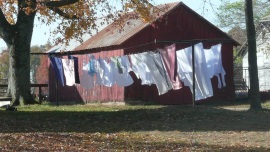23 Ways to “Live Amish”
Have you ever tried to “live like the Amish?” There have been quite a few books and articles written on the subject.
 It’s easy to see why. In a hectic, disjointed world, many of us crave things we see in Amish society. Things like strong community, life oriented around nature, and less dependence on technology, to name a few.
It’s easy to see why. In a hectic, disjointed world, many of us crave things we see in Amish society. Things like strong community, life oriented around nature, and less dependence on technology, to name a few.
Of course, you can’t truly live like the Amish….unless you actually are Amish. That means accepting both the responsibilities and benefits that come with a religious commitment to the Amish church community.
On the other hand, anyone can adopt certain aspects of Amish life in their own lives.
The authors of a piece at rural living website Grit have listed 23 such things they feel are typical of Amish life. Below, the full list (the authors elaborate on each one at the article).
Which of these do you do? Or do you “live Amish” in some way not listed here?
23 Ways Outsiders Can Live Like The Amish
- First and foremost … Have faith.
- Learning to let things be what they are.
- Be frugal.
- Family.
- Community.
- Grow your own food.
- Preserve your own food.
- Eat naturally.
- Learn how to sew.
- Learn crafts that you can sell.
- Use the Bible as your guidebook through life.
- Have gratitude.
- Bloom where you’re planted.
- Teach future generations.
- Leave a small carbon footprint.
- Don’t get caught up in the worldly things.
- Live a simple life.
- Be welcoming to others.
- Be a keeper of the home.
- Share your bounty with others/don’t be greedy.
- Respect the elders.
- Work hard, but have fun.
- Live for today.
Read the full article by Lee Ann and Alexandrea Perez with explanations of each point here.
Image credit: Adair Faust






The list
Should there be a #24 for preserving the land? To grow, preserve, and share the bounty, you have to take care of the land to yield a harvest. It’s common sense for the Amish, but many Englisch haven’t a clue what “compost” is! Just sayin…
As Maudie from the Budget says, Make it a good day 🙂
I think that’s a good addition, Terry.
And well put by Maudie 🙂
I love #13. And I recognize the laundry photo 🙂
I thought you might, Adair…and in case you didn’t I reminded everyone at the bottom of the post 🙂 Have you been to Ethridge lately?
Number 13 is a good one. I could sign up for nearly all of these. Maybe not #9 though 😉
Just noticed that credit, Erik! Thanks. And no, I haven’t been on the road lately. Hoping to get to that area next fall. And if you should take up sewing, pkease Pist a photo!
If I do I’ll be sure to post a photo of my pinpricked thumbs Adair 😉
I try to live them all
I try to live them all and a few more like being a “good steward” not only with money but also with land, clothes anything we own, friendships, family, etc. Each need care and nurturing to thrive. Dress modestly. You don’t need to wear Amish style clothes to dress modestly. Be “old fashioned”, meaning have morals, values and integrity.
Interesting list Erik!!
Living similar to the Amish
Let me say this first. I am not Amish. I respect the Amish and have worked around Amish in my younger days, and we still visit Amish communities occasionally.
I don’t believe I am unique by writing this post, I believe a lot of other people could probably add their name to this post also.
I was born and raised on a farm close to the end of the Great Depression, and the start of WW11 and at that time frugal was not a phrase but a way of life. We raised cows for milk, chickens for eggs Hogs for meat, and we always had a acre or two of garden, without that we probably would have starved to death.
We used Horses and Mules for farming and somewhat for traveling at least thru the 1940’s
When I got married and left home a lot of those frugal concepts were carried with me.
My wife was from a large family (9 brothers and sisters) but was raised in a large city. we both decided to live urban and frugal, (not really Rural but not city either) My wife adapted well to that Urban concept. We have always raised a large garden. We raise hens for eggs, and We still can lots of Vegetables and fruit every year. My wife until this day still hangs out her clothes to dry on a clothesline (though we have a washer and dryer).
We were both involved in church early in our lives and have continued that until this day.
Good Rx
I try to follow most of these, and have for most of my adult life, especially being frugal, letting things be what they are, and having gratitude. I used to do others (and enjoyed them—sewing, making crafts—I mostly gave away, rather than sold—preserving food, are pretty difficult with my “wimpy hand”, but I do what I can and appreciate what OTHERS can still do even more.
Considering this “living Amish” list as a whole, I’d say it should be given out as a prescription to a healthier, happier, more meaningful life. In all honesty, concentrating on doing some of these things (especially #2, 12, 13 & 17) has helped me become more peaceful and helped me to lower my blood pressure, as well!
I just might include this list with my Christmas cards this year!
Thank you!
Oh, just a friendly reminder (as I used to tell my kids when they were younger) to “say ‘Thank You’ in November before saying “Gimme, gimme!’ in December.”
Alice Mary
I’d like to do all but #11. Thanks for sharing, Erik.
Although some things on this list are factual, there are some that are misleading and not honest at all. As a Christian, it really breaks my heart that people are being mislead into believing things that simply are not true for the majority of Amish. If I could have a prayer answered, it would be that a few things in this list would be edited to reflect the truth for the majority of Amish people. The first being the truth about the handling of salvation versus good works. There is nothing more heartbreaking than to drive down my small country lanes and know that many of those I see live in the fear and despair of wondering if they can live “good enough” to be allowed entrance into heaven.
Where was this issue mentioned on the list?
I had the same question 🙂
Generally speaking under 1 and 11
It would generally be under both 1 and 11
“Generally” is right. Quite a stretch!
Hi Debs, if you will permit me to share a few insights with you that I hope will ease the pain you feel in your heart concerning the Amish and their salvation.
It would seem as if there is a misunderstanding by evangelists regarding the Amish which I find is based on two simple misunderstandings. The first has to do with terminology and the second with lifestyle.
Regarding terminology.
When an evangelist approaches an Amish persons and asks if they are saved, the Amish person may reply in a manner that doesn’t satisfy the evangelist by saying “I have a living hope in my salvation”. This will lead the evangelist to ask, “are you born again?”. To this the Amish person may well not be able to give the standard answer that an evangelist would give or expects to hear, causing the evangelist to conclude that the Amish don’t have salvation.
I have heard evangelist answer to the question “are you born again?” with a definite yes, and then proceed to provide a certain date or moment as proof for when they consider themselves to have been born again.
Because an Amish person doesn’t answer the question in this manner, evangelist assume they don’t have or haven’t been born again.
However if the evangelist asked the question differently, they would get the answer they seek.
Rather ask the Amish person if there was some point in their life when they had a moment, when they knew in that moment, that they would be joining the church. That there and then, that is what they knew they would be doing.
The evangelist calls that moment a born again moment, the Amish call that a church joining decision moment. Bottom line, both experience a moment in their lives when they know for sure in that moment that what they are going to do is, surrender to God, stop living a sinful lifestyle and do as the Bible commands. Each just uses different terminology to describe the moment.
Even an Amish youth who does not join the church can tell of a moment when they knew in that moment that they knew for sure that they would not be joining the church. Some despite the moment, still join. Perhaps because of peer pressure or family pressure, just as happens to some evangelist when they feel pressurized to join their church.
I know I experienced such a moment, and later on when I understood what evangelists were really asking of me, I could offer a year for proof of that moment, but I’m not sure of the precise month or day, it was during spring. But the moment I remember very well and what caused me to have that moment when I knew for sure I was going to join the church and surrender my life to God. Even though I got baptized only two years later, I definitely had a moment that lead to it.
Regarding lifestyle.
Evangelist look upon the Amish lifestyle and assume that the Amish live their lifestyle in order to earn salvation.
However, an irreligious person sees no difference between the two lifestyles.
The evangelist has a list of things they consider necessary in a Christians life, such as read the Bible, pray daily, attend church on Sundays, don’t drink, don’t smoke, don’t gamble, don’t profane, don’t blaspheme, don’t fornicate, etc.
The only difference the irreligious person can see between the Amish and the evangelist, is that the Amish list appears a lot longer, is more detailed and more strictly enforced by the church.
Otherwise both seem to have a religious list of do’s and don’ts.
Evangelists have a secondary list that is based on which denomination an evangelist belongs to. So for a Baptist, their secondary list may include, no infant baptism, no dancing, no confession of sins to pastors, no letters to Pope asking indulgences, no worshiping at Mormon or JW churches, etc.
The Amish also have a secondary list based on what the Amish church considers Amish characteristics, such as no TV’s, head coverings, plain clothing, horse and buggy, etc.
When an evangelist says the Amish are living their lifestyle for salvation based on their church’s list of rules (ordnung), the irreligious person wonders what does the evangelist think they’re doing when they also use church rules to live their lifestyle by?
Seems like a scenario of the kettle calling the pot black.
A church telling you how to live your life based on a list of church rules, whether that list has only two rules on it or two hundred, it is still a list of rules the church expects you to follow in order to be a member. One cannot call a long list of rules works by salvation without also implying that the short list is for the self same purpose. If the Amish following their list of church rules is works by salvation, then how is following your list of church rules not also works by salvation? I personally see no difference.
Well I hope this gives you something to consider that will eases the pain in your heart.
Salvation
The proper question to ask anyone whether they be Amish, go to church, identify as Christian is this: Have you confessed your sins and repented and accepted the gift of forgiveness through the cleansing blood of Yeshua who died and rose again so that we may have eternal life? That would settle the matter without any confusion.
What ? I believe in salvation and so do many Amish I know. There are many misconceptions out about the Amish and just because a few small ultra conservative, extra-traditional Amish believe Good Works will get them to heaven does not mean the majority of us do. We believe in salvation, we just don’t believe in once-saved, always saved, we believe that anyone can fall away, but there is always a chance for forgiveness if there is a true repentance. We also believe that if we are God’s children we will take up our cross and follow Him and follow His rules given in the Bible, especially the New Testament.
Well said, Rebecca.
Well said. Thank you for being an actual amish voice.
As a Christian, it really breaks my heart that people are being mislead into believing things that simply are not true for the majority of Amish.
Deb, I have used your own words to express how I feel as an Amish man who believes my salvation comes from having accepted Christ. An apple tree is not an apple tree because it has apples on it, an apple tree grows apples because it IS an apple tree. I see “good works” as being a reflection of inner conversion. Hang all the good works/ apples you want on a nut tree, it won’t make it into an apple tree/ Christian. To imply the majority of our people “live in the fear and despair of wondering if they can live “good enough” to be allowed entrance into heaven” is a sad misrepresentation of those of us who are born-again Christians.Yes, it does break one’s heart when people are mislead into believing things that simply are not true for the majority of the Amish.
Jesus answered and said unto him, Verily, verily, I say unto thee, Except a man be born again, he cannot see the Kingdom of God. John 3:3.
Thank you for clarifying
Thanks for this – I’ve seen views like Deb’s expressed a number of times, and it always seemed very odd to me that anyone would question whether members of a church with a radical Reformation heritage believed in salvation by grace through faith. I think that people assume that Amish Christians keep the Ordnung in order to earn salvation (hence the assumption that anyone would doubt whether s/he has been good enough), rather than keeping it out of gratitude for salvation already given.
Verity pink, I like your comment about doing Good Works out of gratitude to Christ. That is exactly what I was trying to say. I do not live as an Amish person because I believe I’ll get to heaven through being Amish. But out of great gratitude to God for allowing me to have been born into a Christian home and church I have chosen to stay Amish and help the church to continue and grow and help those around us. We can show we love Christ by following His commandments. There are many around us who don’t understand us because they have not been raised this way. It is a great insult to me when people refer to us as only trying to earn our way to heaven. To think that my dear Grandparents, parents, the ministry, my friends and family are all living in fear of not doing enough Good Works to get to heaven. How far off the truth that would be. I chose to be Amish because I see the love, joy, peace they have, the security of belonging to such a people, and I can live out my Christian life as a child of God without all the trappings of the world, not because I believe it is the only way to live a Christian life, but because it is one way to live a Christ-centered life. Blessings to you all.
more than one "Amish" perspective
The understanding the First Lady expressed her concern about is valid and extends to the Anabaptist community at large. But I want to point out that even understandings of specific words vary between individuals, churches and communities. Many Amish will say they believe in being “Born Again” but will say they don’t equate that with being “saved” because they try don’t believe that the new Birth is the final ultimate saving act. Most feel that works, being part of the church, living by the ordnung are in someway linked to Gods final decision on whether they are saved or not. I am not writing to defend one side or another at this time, only trying to increase the understanding between one another. By the way this is the most debated, misunderstood, miscommunicated and divisive topic among all Anabaptists. I think the reason is ultimately that care about one another’s eternal destiny. But it is easy to become ineffective in communication when we desire to control the outcome of the conversation. So here I leave the group with my thoughts and accept that the outcome has very little to do with me.
on faith and works
From what I have understood, the general Amish belief, at least among Old Amish groups, is that people cannot be sure of their salvation, as that would presume to know the mind and will of God. They hope and trust that they will make it to heaven, but they are not “sure,” and they believe that their behavior will affect that. This doesn’t mean empty actions for the benefit of others; it means a sincere heart. But it’s more than simply “I believe in Jesus, the end,” as some Christians think is enough.
I will share an excerpt from the most recent letter from an Amish friend who is going through a difficult time:
“The end of our lives is coming, and how do we want to meet our Saviour? Not with bitterness. Not with grudges. Not with hate.
. . .
God will help us to rise above Satan’s evil darts. It will be my fault if I should miss heaven and succumb to hell. That must be faced.”
I know not all Amish groups believe exactly the same way, and from my understanding, New Order Amish are closer to other Christian groups in believing they can “know” they’re saved. My friend, obviously, is Old Order.
Hi MW, excellent comment, like your example of the apple tree.
Truthfully, I seriously do struggle to understand how people can claim to have salvation. I have thought long and deep about it and I just cannot claim such a thing.
The Bible states that all believers have assurance of salvation, but how do I know that I am a true believer? Maybe I am just fooling myself into thinking that I am one.
When Jesus says to me on Judgement Day, “enter My true and faithful servant” then I will know for a certainty that I was a true believer.
But until that day, how can I know? for the Bible warns us, Luke 11:35 “Take heed therefore that the light which is in thee be not darkness.”
Perhaps this is me. What mortal man can tell me it is not? Perhaps they are standing in the same darkness as myself? and when “the blind shall lead the blind, both shall fall into the pit.”
Consider Matthew 7:21-23 as well in this regard. They believed they had salvation and yet Jesus said to them “depart from Me I know you not.”
We know from the Martyrs Mirror that there were many that claimed to be true believers, were even considered by the brothers to be true believers. That was until they were captured and under the trials and tribulations of torture and sufferings they recanted of their faith.
Perhaps that is me as well. Until I experience such sufferings and pass through the third baptism of fire, how will I know for a certainty that my faith is not as empty and shallow as theirs was?
What makes me any more stronger in faith than they were? Its easy to be strong in the absence of persecutions.
The only truthful answer I can give is that I believe in a living hope of salvation, that my hope lies in Jesus for my salvation, that His blood shed on Calvary will cover my shortfalls and weaknesses, that is my living hope. Anything else seems like wishful thinking.
Is this your thoughts on the topic as well?
Mark, if you read this, you are New Order, how do you understand this?
whoops sorry, correction, instead of ‘can claim to have salvation.’, it should read, ‘can claim to know they are saved?’.
Bringing theology into it
Isn’t it completely obvious that anyone who fully agreed with the theological underpinnings of the Amish faith would BE Amish, not just cherry-picking a few things we thought we could learn from the Amish? Those of you who are worried that they’re not “saved,” we get it: You don’t agree with their theology of salvation. Know what? They don’t agree with yours, either. That doesn’t mean you can’t learn from each other without one becoming the other.
You can each live as you see fit. God bless America!
Agreed, Trish. It’s too bad people have to derail an otherwise productive discussion with theology, particularly in a “isn’t it sad how wrong other people are” manner.
MW - You Hit The Nail On The Head
MW – you have hit right on the mark!
We have a friend (who passed away back in June) that was a deacon in an Old Order church in Holmes County. I can tell you that from conversations we have had, he and his wife, and his family and many members of their church believe first that they are saved by grace through faith. They have no question of that. Second, they believe that by the knowledge that they have been saved by grace through faith it is incumbent upon them to live as Jesus would have them live and that includes doing good works. I will say this, they struggle with the whole notion of anyone “knowing with certainty” that one will go to heaven for just believing – for them that borders on the pretext of a human being knowing the mind of God and it seems boastful and presumptive. I can’t say that I disagree with any of it; I belive that I have been saved by grace through faith and that good works are what should come from that belief, but I can’t, with good conscience state that I know for certain that I will go to heaven as only God knows that for certain.
Response to Mary
The way that I see it is that Jesus promised His disciples that He was going to prepare a place for them, and He did that knowing that by far the bigger job would be to prepare them for the place. So my faith that I am going to Heaven is rooted first in God’s faithfulness, and what He has done for me and is doing in me, but also in His omniscience, because He knew exactly what He was taking on when He called me to follow. And if He thinks He can do it – who am I to question?
I enjoyed this post and read the link to the full article. I try to live my life according to most of these (but likely won’t ever
do numbers 9 and 10). It can be challenging to live like this in the U. S. today, especially in a fairly large urban area like where I live. I am glad number 5, “community”, was mentioned. I am grateful to be part of a church community where many of the members strive to live like this. Support from others is very important.
23 Amish Virtues
All are wise and for the Amish Aficionados, or wanabee’s a list to live up to. All are worthy. One of your posts taught me about 13. Keep up the great work.
23 Ways to Live
These are great. A list of ways we all should live.
I am Catholic, but I have always admired the Amish. Their dedication to God, simplicity, and hard work is beautiful to me. I think some of us more mainstream Christians can learn a thing or two from them. We have Mennonites where I live, no Amish as far as I know, but my brother used to live in Geauga County, Ohio, and I just admired how they seemed so happy doing that. Even smiled at a beautiful Amish woman at a gas station of all places (I know they do not entirely eschew all modern conveniences, and I know this because of your site, thank you). I think that, if there were a way we can take the best from the Amish and the best from the Amish world, and find some sort of middle ground (without becoming Mennonites, no offense to them, because I think they are lovely), we’d be a lot better off. Be modern but don’t be so quick to change. (Says he on his laptop)
Livig like the Amish
Und noch eins: lerne mal Deutsch!! (Das meine ich nicht Ernst, obwohl der deutsche Dichter Johann W. von Goethe einmal gesagt hat, dass wer fremde Sprachen nicht kennt, der weiss nichts von seiner eigenen. Andere Sprachen werden in den USA nicht betont,immerhin ist es aber gut, wenn man eine zur Hauptsprache fliessend kann. Kommunikation, Aufgeschlossenheit, Hilfsbereitschaft, na, alle sind doch gute Eigenschaften!!)
One in English and an explanatory note or “Randbemerkung” to my last comment: I was kidding, but am glad I know several languages. It’s quite fun actually…
Now for the REAL suggestion: have a good, clean sense of humor!! My friend Henry B., an Old Order Amishman, had the best and loved dearly to laugh with the customers in his store (now owned by his niece in Somerset County, PA). I’d like to pass along a cute Henry B. joke: Once, when we were in the store sort of hanging out after I bought my German books, another friend of his came in. Henry said to us that there are two ways to argue with a woman, after which he was silent. We looked at each other, then at Henry. When we looked at him confusedly, he shrugged and said, “Neither one works!” Of course, his wife (a dear lady for sure and for certain) laughed just as heartily as the rest of us.
Good values, faith in the Good Lord of course, for the Amish are Christians, and willingness to be there for friends in good times and bad are things that help us all. These the Amish have in great abundance, and I hope everyone will try and emulate these 🙂